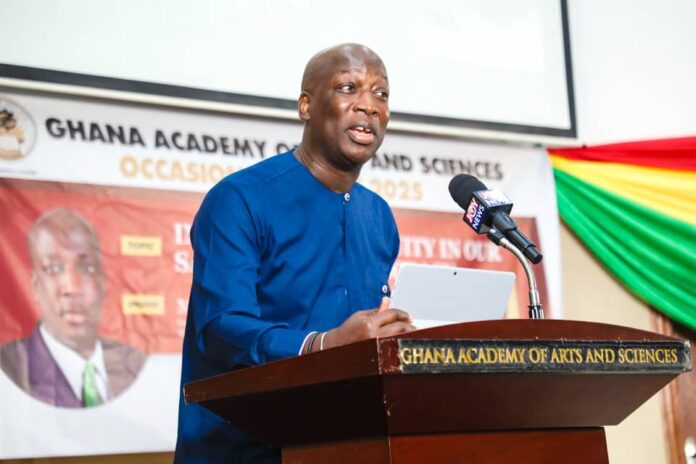Former Executive Vice-President of Global Markets at Unilever, Mr. Yaw Nsarkoh, has called on Ghana’s intellectual and professional class to rise above apathy and reclaim their civic duties as essential to a thriving democracy.
Delivering a powerful occasional lecture at the Ghana Academy of Arts and Sciences in Accra on Thursday, June 19, Mr. Nsarkoh warned that Ghana’s democracy risks decay without the active engagement of its educated elite.
Speaking on the theme “Iniquities of Iniquity in Our Santa Claus Democracy”—which he described as reflective of the current political state—Mr. Nsarkoh argued that disengaged intellectuals leave democracy vulnerable to transactional politics, populism, and mediocrity.
He criticized Ghana’s political culture for prioritising patronage over progress, and entertainment over evidence-based policymaking, thereby allowing incompetence and inequality to flourish.
“Peace, harmony, justice, and true freedom will continue to elude societies where egregious inequality is normalised and independent thought is feared,” he declared.
Drawing on the ideas of Nobel Laureate Amartya Sen, Nsarkoh stressed that true development goes beyond economic growth to include the elimination of systemic poverty, deprivation, and political repression—goals that demand robust intellectual participation.
He lamented the decline of Ghana’s public university system, which he said was once deeply connected to the struggles of ordinary people. He traced the erosion of academic and civic engagement to neoliberal reforms of the 1980s and 1990s, which, in his view, traumatised intellectual culture in African higher education and weakened its democratic role.
Citing examples from China and post-colonial reform movements, Mr. Nsarkoh underscored the power of knowledge in shaping national development. “All people who have made meaningful progress prioritised the acquisition and deployment of knowledge,” he said, urging Ghana to adopt policy frameworks that promote original research and academic integrity.
He also condemned the rise of pseudo-intellectualism in Ghana, warning against the normalization of unearned titles and empty accolades.
“The media inflation of titles and the prostitution of the reward system for genuine achievement must be stridently and institutionally discouraged,” he stated, adding that such trends erode meritocracy and stifle excellence.
Mr. Nsarkoh challenged scholars and professionals to break out of isolation and engage with the broader society to shape governance and national direction.
“Intellectuals must build courage,” he said. “No constitutional arrangement on earth can guarantee freedom to a people who are not willing to fight for it, cherish it, and organise to defend it.”
He concluded by urging Ghana to harness its intellectual capital not only to address complex development challenges but also to safeguard the integrity and future of its democracy.


